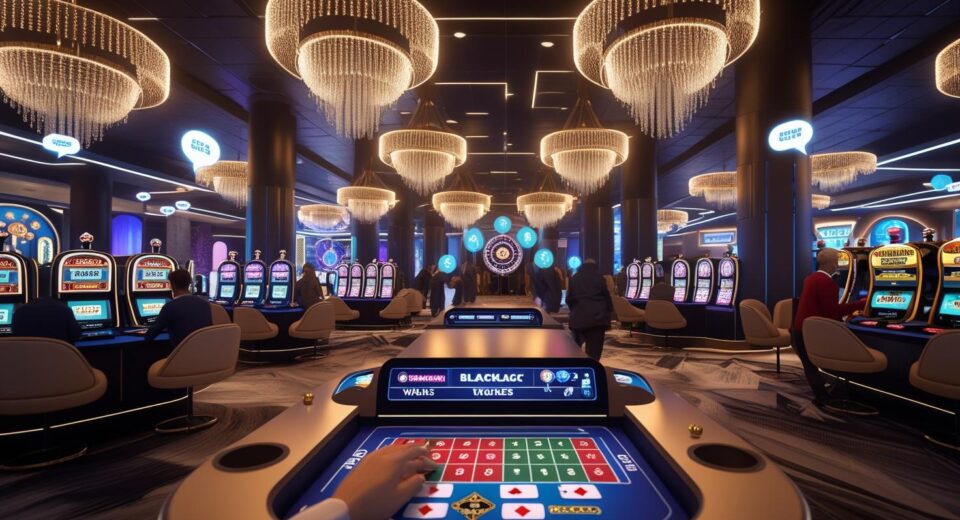From neon-lit blackjack tables to avatar-hosted poker tournaments, virtual reality casinos are not science fiction—they’re here, they’re real, and they’re reshaping the house edge. 👓 Step Inside the Metaverse — The Chips Are Real Imagine this: You slip on your VR headset. You’re no longer in your living room—you’re in Monte Carlo 2.0, only bigger, bolder, and neon-lit like Blade Runner. A holographic croupier greets you by name. You take a seat at a velvet-roped poker table, where avatars from Tokyo, Toronto, and Tel Aviv are already raising stakes. This isn’t a future fantasy. This is VR gambling in 2025—and the industry is betting billions that you’ll show up, sit down, and stay for a while. 🧠 Why VR + Gambling Just… Works Gambling has always been about immersion. The sounds. The lights. The tension. The glamour. VR simply digitizes and amplifies that entire experience. But there’s more to it: And let’s not forget: VR lets you do things no physical casino can. Play poker on the moon? Spin a slot machine while flying a dragon? Done. 💸 Who’s Already Cashing In? VR gambling is no longer a fringe experiment—it’s a rapidly growing vertical: 1. PokerStars VR Owned by Flutter Entertainment, this free-to-play app launched on Meta Quest and Steam. It includes: It doesn’t use real money yet—but the conversion funnel is obvious. 2. SlotsMillion VR Billed as the first real-money VR casino, it offers: 3. Decentraland & The Sandbox While not purely gambling platforms, they’ve hosted: Web3 platforms are merging metaverse + gambling like never before. 🕹️ The Technology Stack: What’s Under the Hood? To build a VR casino, you need more than chips and code. You need: And if you want realism? You’ll be using motion capture, haptics, and AI NPCs (non-player characters) that can simulate table conversation and even bluff detection. This isn’t slot software 2.0. This is a Hollywood-level production—with odds. 🧑⚖️ Regulation Is Lagging Behind… For Now Here’s the spicy part: most gambling regulators aren’t ready for this. The problem? VR casinos can operate in pseudo-anonymous spaces. Real money. Avatar identities. Global reach. Little oversight. Expect regulators to play catch-up in the next 12–18 months. But until then? It’s the Wild West in 3D. 🤝 Social Gambling or Social Engineering? VR doesn’t just make you gamble. It makes you stay. Players report: Remember those loss-simulating coin showers in Vegas slots? Now imagine 3D fireworks, confetti, cheers from surrounding avatars, and a croupier who high-fives you—in full VR. Some critics call it “psychological overkill.” Others call it progress. 🔐 Privacy, Security & Scams: The Flip Side With great immersion comes… great risk: And let’s not forget: if your VR headset gets hacked, your eyes and hands are the input device. That’s biometric data risk 101. Operators who don’t integrate Web3 security protocols, anti-fraud AI, and layered KYC will not last. 📈 So… Is It Actually Profitable? Let’s talk numbers: Why? Because VR doesn’t feel like gambling. It feels like gaming. And that subtle psychological shift means higher spend, longer play, and deeper retention. 🤔 Is It Ethical? Big question. Critics argue: Proponents say: The truth? Probably somewhere in the grey. But the headset’s already on—and no one’s hitting pause. 🌍 What the Future Holds: The Next 5 Years 1. AI Dealers with Real Personalities Imagine playing blackjack with an AI dealer that remembers your tells and cracks jokes in your language. 2. Cross-Casino Metaverses Switch from a sci-fi poker club to a Roman colosseum slot lounge with a single click. 3. Wearable Tech Integration Haptic gloves that let you feel your poker chips. Eye tracking that adjusts odds offerings based on attention. 4. Crypto Native VR Casinos DAO-run casinos where the house is the player base. Token holders vote on payouts, themes, and expansion. 🎯 Final Spin: Ready or Not, the VR Revolution Is Dealing In VR casinos are not a gimmick. They’re a logical evolution of everything gambling wants to be: It’s the metaverse’s first killer app—and the dice are rolling faster than regulators can blink. Will it disrupt the entire industry? Not overnight. But one thing’s for sure: when the future of gambling puts on a headset, it’s not stepping back out anytime soon.









